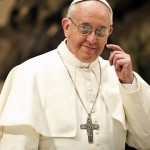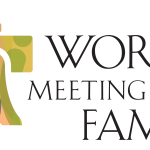
Got a big family? Then you already know that you’re crazy, a traitor to feminism, and a slave to the patriarchy; you’re neglecting most of your kids and robbing the rest of their childhood; you’re a burden on the system in general, and you probably don’t own a TV.
But wait, there’s more! Don’t forget, you’re also destroying the earth.
It’s become fashionable, in the name of the planet, to denounce large families as irresponsible, even selfish. Some politicians and a good many combox blabbermouths even say that it should be illegal for people to have more than one or two “replacement” children. Illegal!
And yet, if we can get beyond the inflammatory rhetoric, do radical environmentalists have a point? Should we slow down a little? It almost seems like common sense, especially when you’re having one of those days when you do feel a little crowded by the swarms of ravening locusts — uh, I mean, treasured offspring who share your last name.
After all, aren’t Catholics supposed to be good stewards of the earth? Isn’t it true that we “lotsas” are using more than our share of natural resources, burning more than our share of carbon, and just plain taking up too much space?
Probably not. Moms of many already know that the work of caring for, for instance, seven children is not the same as caring for one child times seven. In some ways, it’s easier. In the same way, many large families actually have a smaller carbon footprint than a typical family with one or two kids. A household of nine is not like a household of three times three. It just doesn’t work that way.
Moreover, when larger families do have an environmentally friendly profile, it often occurs naturally as a result of the family’s large size, not despite it. It’s not the numbers that count; it’s the lifestyle.
As Pope Francis says in Laudato Si,
To blame population growth instead of extreme and selective consumerism on the part of some, is one way of refusing to face the issues. It is an attempt to legitimize the present model of distribution, where a minority believes that it has the right to consume in a way which can never be universalized, since the planet could not even contain the waste products of such consumption. Besides, we know that approximately a third of all food produced is discarded, and “whenever food is thrown out it is as if it were stolen from the table of the poor.”
By necessity or for convenience, big families tend to naturally fall into patterns of behavior that would make Pope Francis proud.
How? Here are a few ways:
Cars Count
Let’s start with that enormous van we drive — could it be eco-friendly? Sure. It’s certainly not fuel efficient; it’s just that it’s usually parked in the driveway. With ten kids in tow, I leave the house as close to zero times as possible, bringing our weekly mileage to far less than the national average (and if you’re calculating PMPG or “people miles per gallon” — that is, how many people get moved per gallon of gas — large families look even greener). My husband has a smaller, more fuel-efficient car, which we use if only a few kids are on board.
And how often do we fly? Well, the stewardess is still in therapy from the last time our family boarded a plane together, about twelve years ago. We’d rather get our kicks at the beach down the road than go through the agony of air travel, which the New York Times called the “biggest carbon sin.”
Economy Size
How about electricity? Do twelve people use more than three or four? Not necessarily. Six kids playing Dinosaur Wedding do it by the light of a single light bulb, just like one or two kids would. Two or three kids fit in a bathtub at a time, and there aren’t enough hours in the day for all of us to shower daily. The oven stays on 350 degrees for 45 minutes, no matter how big the meatloaf.
Cozy Quarters
Most large families I know don’t live in energy-hogging giganto-mansions. They live in normal houses, they’re a little crowded, and they have lots of bunk beds. (They do, however, tend to go for big yards, lots of trees, and gardens. Natural wildlife preserves, you might say.)
Reduce and Re-use
Many large families also live with tight budgets. We happily trade a second or third income for another armful of babies. The quick and easy methods of saving the environment that make the news daily are hardly news to cash-strapped families: Turn down the heat, insulate, avoid anything disposable, buy in bulk, cook from scratch, breastfeed, don’t eat out, don’t waste this, don’t buy that. Turn out the light, close the door, unplug it, wash in cold water, make it do or do without. And if it does not get eaten for dinner, we serve it for lunch.
Even if we have plenty of money, the sheer clutter forces us to try and live simply and learn to do without excess stuff.
What a revelation! And so good for the earth.
Make Do
How about consumption of goods? My family and many Catholic families I know are almost complete failures as consumers. Our house is mostly furnished, from the couch to the car to the pots and pans and coffee cups, with used goods. We are not, for the most part, consuming new products, with all their attendant carbon costs in manufacture and transport. By taking in used things, we’re also preventing an entire houseful of stuff from clogging up the landfills.
Pregnancy is green
Babies perform a service to the world before they’re even born: they excuse their moms from using (and sending to landfills) pads and tampons for nine months — longer, if they breastfeed enough for lactational amenorrhea. And what about birth control pills? Catholics who refuse to use them are also refusing to excrete endocrine-disrupting hormones into the water supply.
Pass It On
Large families tend to buy used clothes, books, and toys, and we hang onto them, passing them down from child to child, even to the next generation. The thermal onesie on my baby last winter? It started life keeping my oldest nephew warm, then went on to clothe every one of my ten kids so far.
Not convinced? Still feeling some eco-guilt as you survey all the little consumers you’ve produced? Go ahead and plug your own family’s stats into one of the many carbon calculators available online (try SafeClimate.net). You may be surprised at how “be fruitful and multiply” translates quite naturally into treading lightly on mother earth.
Last time I took my family’s numbers and plugged them into the first three carbon calculators that Google turned up, we consumed and emitted less than the national average for a family of three. And we were just trying to get through the week.
But what about the future?
This is all very well, some will say, as long as your many children all live with you in your little green shoe. You may be very thrifty today, but what about when they all grow up and move out? More people is more people, no matter how you slice it.
For this argument, I have two answers.
First is that grown children of large families tend to be what you might call natural conservationists. Children who grow up as one of many are likely to have learned that they’ll survive without buying stuff, that it’s okay to share, that material things come and go, and that, like it or not, we all depend on each other for survival.
So who will I be sending out into the world? A small crowd of perfect environmentalists.
Second, children of families that are open to life also know something much more important, something that rabidly utilitarian environmentalists still don’t seem to realize: A human soul is more than the sum of how many kilowatts he consumes. This is what it comes down to. Human beings are a gift to the world.
What can we say to people who do not realize that the human family is the very seat of love, and that procreation is the ultimate human imitation of the action of the Holy Trinity? What can you say to people who somehow truly believe that everything humanity does is something to be apologized for — that the only good human is a human who was never born?
There is nothing you can say. Satisfy yourself that you’re not being wasteful, and then answer not the fool according to his folly. Love your children, and teach them to love each other; and if you and your brood feel like a sign of contradiction, then that’s a good sign.
The call of Laudato Si is nothing new. The Catholic Church has been teaching this lifestyle for thousands of years: a lifestyle of welcoming children while being careful and generous with the way we live. There is no contradiction between loving and caring for the earth and supplying it with inhabitants: We are commanded to do both.
Was it short-sighted when God the Father explained these things to Adam? Was it hyperbole when Christ asked, “What does it profit a man, if he gain the whole world, but suffer the loss of his own soul?”
‘A Great Big Yes’
Our beloved Benedict XVI said of big families:
“Their Yes to one another in the patience of the journey and in the strength of the sacrament with which Christ had bound them together, had become a great Yes to themselves, their children, to God the Creator and to the Redeemer, Jesus Christ. Thus, from the witness of these families a wave of joy reached us, not a superficial and scant gaiety that is all too soon dispelled, but a joy that developed also in suffering, a joy that reaches down to the depths and truly redeems man.”
Of course it’s Catholic to be an environmentalist. Of course it’s our job to care for the earth. But even more, it’s our job to remember, and to teach our children, that this world will not last, and to live accordingly.
“All flesh is as grass, and all its glory as the flower of grass; the grass withered, and the flower has fallen — but the word of the Lord endures forever” (Isaiah 40:6).
How will it endure, if there is no one to hear it? Let us answer the “No” of child-fearing radicals with a joyful and ancient “Yes.” The world needs big families.
***
Related reading
Ignatius Press: Fr . Fessio, Vivian Dudro, Mark Brumley, and John Herreid discuss Laudato Si
Jen Fitz: The Terrible Problem with Laudato Si
Epic Pew: You won’t hear this from the mainstream media
Elizabeth Scalia: All Our Sin, All of Our Hatred On Trial
Tom McDonald Tweeting as he reads
Kathy Schiffer: This is completely Catholic
John Allen: The Pedigree of Laudato Si
George Weigel: It’s about us
Mark Shea: Chesterton on Laudato Si
Lisa Hendey: Laudato Si and me
Stream: 11 Good Take-aways
Joseph Susanka: Advice as you prepare to read
CWR Encyclical focuses on Heart of Man
LarryD: Brace yourself…
Phil Lawler: It’s more provocative and less political than expected
Gregory Popcak: Something Fishy: Why is THIS missing from the encyclical?
Rebecca Hamilton: Fourteen Things Laudato Si Says. Nine Things It Does Not Say.
Laudato Si in hardcover from Ignatius Press
***
***
This article originally ran, in a slightly different form in Faith and Family magazine in 2010.












